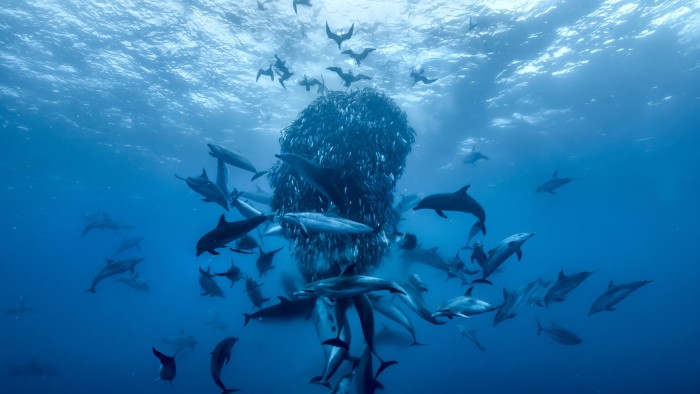Hours before King Charles, former Spice Girl Geri Halliwell-Horner and astronaut Tim Peake were among the stars gracing the “blue” carpet at the London screening of Ocean with David Attenborough last month, the real premiere of the documentary took place at the same venue.
Rather than adults, it was more than 1,000 students from England (and a few grown-ups) who were the first viewers of what Attenborough has called one of the most important documentaries of his seven-decade long career.
“After almost 100 years on the planet, I now understand the most important place on Earth is not on land, but at sea,” the British naturalist said during the film. The 99-year-old warned of accelerating destruction of ocean ecosystems because of climate change and intensive fishing practices such as bottom trawling, where heavy nets are dragged across the seabed.
The pupils, aged 8-18 and in uniforms of many shades, watched quietly, enthralled and at times horrified for the 95 minutes of the film. When it ended, they erupted in deafening cheers. Every time the applause seemed to be tailing off, the boy in front of me — about 10 years old — clapped even harder.
Even before the screening, the young people had flocked to stands showcasing the work of water-focused scientific organisations, charities and various groups that dotted the foyer spaces at the Royal Festival Hall on London’s South Bank, fascinated by the submarines, underwater cameras and giant globes. At marine conservation organisation the Blue Marine Foundation’s stand, their virtual reality headsets were so in demand I never managed to try them.
The ocean has long “been overlooked in conversations about biodiversity loss and climate change”, says Jo Coumbe, communications director of Blue Marine, which helped organise the children’s attendance.
But a focus on oceans is needed, because the situation is bleak. Over the past two years, the global average sea surface temperature hit record levels and has struggled to fall, with many bodies of water experiencing protracted heatwaves. An ongoing coral bleaching event is the worst on record, affecting about 85 per cent of the world’s reefs.
Our formerly biodiverse waters are turning into marine deserts. The Attenborough film in brutal fashion revealed how kelp forests and seagrass meadows, the ocean’s equivalent of rainforests, are being ripped from the seafloor because of bottom trawling.
As the images flickered across the screen of nets destroying everything in their path, I wondered how many of the children around me would avoid fish and chips, as British schools often serve on Fridays, after watching the film.
Bottom trawling has also been linked to climate change. A study in the science journal Nature found that the annual carbon dioxide emissions released from bottom trawling are similar to those from global aviation.
Inka Cresswell, marine biologist and wildlife filmmaker, says: “We need people to see the damage, to understand that what happens beneath the surface has a direct impact on not just the health of our oceans but the future of our planet.”
The ocean has absorbed 90 per cent of excess heat and about a quarter of human-caused carbon dioxide emitted during the industrial era, helping limit the effects of warming temperatures for those of us on land. As Michael Meredith, oceanographer at the British Antarctic Survey, told me last year, “the ocean has been doing this huge climate favour for us for decades”.

Almost eight years after Attenborough’s Blue Planet II put a spotlight on plastic pollution, the question now is whether the world can be distracted long enough from trade wars and geopolitics to pay attention to ocean damage.
The ocean can “recover faster than we had ever imagined” if the world responds, Attenborough said in the film, which was released just weeks before countries are due to meet in France at a UN conference to discuss the future of the world’s seas.
The children who watched Ocean will have to live with the consequences of the decisions made in Nice. And the students are well aware: a survey by Greenpeace earlier this year found that nearly four in five primary-aged children in the UK say they are worried about climate change.
In a rallying cry from the stage before the screening, Amelia Crews of youth-led environmental communications company Earth Minutes, said Ocean was “one of the most crucial films of our time” and asked “as young people, what is our role in ocean action?”
More stories in this report
Enric Sala, who was a scientific adviser for the film and leads the National Geographic Pristine Seas conservation project, said that every piece of the ocean that is protected is because someone had an idea.
“I hope many of you can be that person who says: ‘I really want to see my ocean backyard protected’. That is my great hope.”
Ocean is ultimately a message of hope and a call to action, producer and director Toby Nowlan added. “Everyone who has been part of making this film believes that this will create and enable a moment of change for the planet.”
At the star-studded screening that evening, I was told by a colleague who attended, the atmosphere was different. There was applause and cheering — a standing ovation even. But there was much less of the hope and the belief they could make a difference, which dominated the children’s screening. And yet the world doesn’t have time to wait for the kids to grow up.
Attracta Mooney is the FT’s climate correspondent
